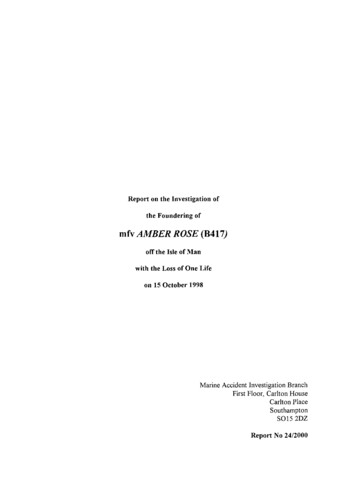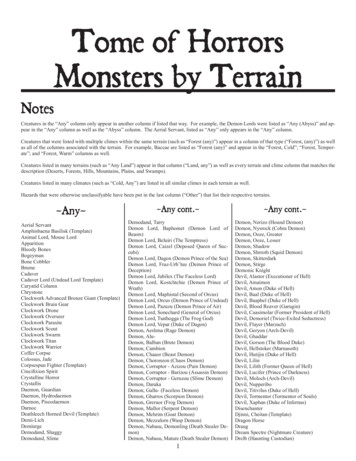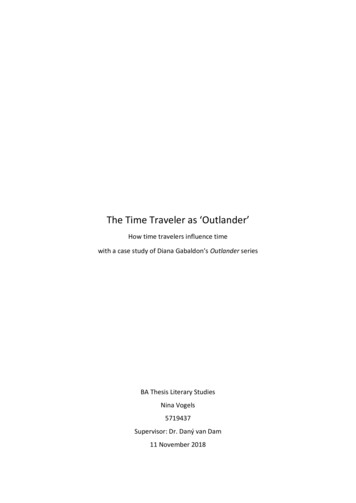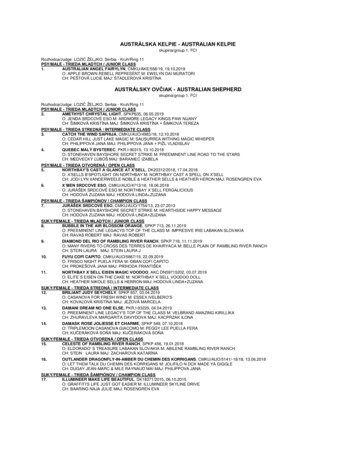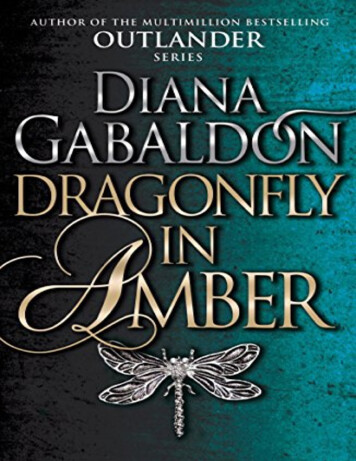
Transcription
ContentsTitle pageDedicationPraise for Dragonfly in AmberAcknowledgmentsProloguePart OneChapter 1Chapter 2Chapter 3Chapter 4Chapter 5Part TwoChapter 6Chapter 7Chapter 8Chapter 9Chapter 10Chapter 11Chapter 12Chapter 13Chapter 14
Chapter 15Chapter 16Chapter 17Part ThreeChapter 18Chapter 19Chapter 20Chapter 21Part FourChapter 22Chapter 23Chapter 24Chapter 25Chapter 26Chapter 27Chapter 28Chapter 29Part FiveChapter 30Chapter 31Chapter 32Chapter 33
Chapter 34Chapter 35Part SixChapter 36Chapter 37Chapter 38Chapter 39Chapter 40Chapter 41Chapter 42Chapter 43Chapter 44Chapter 45Chapter 46Part SevenChapter 47Chapter 48Chapter 49Books by Diana GabaldonExcerpt from VoyagerCopyright Page
For my husband,Doug Watkins—In thanks for the Raw Material
“THE PAGES PRACTICALLY TURN THEMSELVES Gabaldon is a born storyteller She writesa prose that is brisk, lucid, good-humored and often felicitous. Gabaldon is obviously just over thethreshold of a long and prolific career.”—Arizona RepublicPraise forDRAGONFLY IN AMBERand Diana Gabaldon“I LOVED EVERY PAGE DIANA GABALDON WEAVES A POWERFUL TALE LAYERED INHISTORY AND MYTH.”—Nora Roberts“MARVELOUS IT IS A LARGE CANVAS THAT GABALDON PAINTS, FILLED WITHSTRONG PASSIONS AND DERRING-DO.”—San Francisco Chronicle“COMPULSIVELY READABLE INTRIGUING Gabaldon offers a fresh and offbeat historicalview.”—Publishers Weekly“ENGAGING TIME TRAVEL AN APPEALING MODERN HEROINE AND A MAGNETICROMANTIC HERO a most entertaining mix of history and fantasy whose author, like its heroine,exhibits a winning combination of vivid imagination and good common sense.”—Kirkus Reviews“BRILLIANT, ASTONISHING A RIVETING HISTORICAL NOVEL THAT RIVALS THEBEST.”—Rave Reviews
AcknowledgmentsThe author’s thanks and best wishes to:the three Jackies (Jackie Cantor, Jackie LeDonne, and my mother), guardian angels of my books;the four Johns (John Myers, John E. Simpson, Jr., John Woram, and John Stith) for ConstantReadership, Scottish miscellanea, and general enthusiasm; Janet McConnaughey, Margaret J.Campbell, Todd Heimarck, Deb and Dennis Parisek, Holly Heinel, and all the other LitForumiteswho do not begin with the letter J—especially Robert Riffle, for plantago, French epithets, ebonykeyboards, and his ever-discerning eye; Paul Solyn, for belated nasturtiums, waltzes, copperplatehandwriting, and botanical advice; Margaret Ball, for references, useful suggestions, and greatconversation; Fay Zachary, for lunch; Dr. Gary Hoff, for medical advice and consultation (he hadnothing to do with the descriptions of how to disembowel someone); the poet Barry Fogden, fortranslations from the English; Labhriunn MacIan, for Gaelic imprecations and the generous use of hismost poetic name; Kathy Allen-Webber, for general assistance with the French (if anything is still inthe wrong tense, it’s my fault); Vonda N. McIntyre, for sharing tricks of the trade; Michael Lee West,for wonderful comments on the text, and the sort of phone conversations that make my family yell,“Get off the phone! We’re starving!”; Michael Lee’s mother, for reading the manuscript, looking upperiodically to ask her critically acclaimed daughter, “Why don’t you write something like this?”; andElizabeth Buchan, for queries, suggestions, and advice—the effort involved was nearly as enormousas the help provided.
PROLOGUEI woke three times in the dark predawn. First in sorrow, then in joy, and at the last, in solitude.The tears of a bone-deep loss woke me slowly, bathing my face like the comforting touch of a dampcloth in soothing hands. I turned my face to the wet pillow and sailed a salty river into the cavernsof grief remembered, into the subterranean depths of sleep.I came awake then in fierce joy, body arched bowlike in the throes of physical joining, the touchof him fresh on my skin, dying along the paths of my nerves as the ripples of consummation spreadfrom my center. I repelled consciousness, turning again, seeking the sharp, warm smell of a man’ssatisfied desire, in the reassuring arms of my lover, sleep.The third time I woke alone, beyond the touch of love or grief. The sight of the stones was freshin my mind. A small circle, standing stones on the crest of a steep green hill. The name of the hillis Craigh na Dun; the fairies’ hill. Some say the hill is enchanted, others say it is cursed. Both areright. But no one knows the function or the purpose of the stones.Except me.
PART ONEThrough aLooking Glass,DarklyInverness, 1968
1MUSTERING THE ROLLRoger Wakefield stood in the center of the room, feeling surrounded. He thought the feeling largelyjustified, insofar as he was surrounded: by tables covered with bric-a-brac and mementos, by heavyVictorian-style furniture, replete with antimacassars, plush and afghans, by tiny braided rugs that layon the polished wood, craftily awaiting an opportunity to skid beneath an unsuspecting foot.Surrounded by twelve rooms of furniture and clothing and papers. And the books—my God, thebooks!The study where he stood was lined on three sides by bookshelves, every one crammed pastbursting point. Paperback mystery novels lay in bright, tatty piles in front of calf-bound tomes,jammed cheek by jowl with book-club selections, ancient volumes pilfered from extinct libraries, andthousands upon thousands of pamphlets, leaflets, and hand-sewn manuscripts.A similar situation prevailed in the rest of the house. Books and papers cluttered every horizontalsurface, and every closet groaned and squeaked at the seams. His late adoptive father had lived along, full life, a good ten years past his biblically allotted threescore and ten. And in eighty-oddyears, the Reverend Mr. Reginald Wakefield had never thrown anything away.Roger repressed the urge to run out of the front door, leap into his Morris Minor, and head back toOxford, abandoning the manse and its contents to the mercy of weather and vandals. Be calm, he toldhimself, inhaling deeply. You can deal with this. The books are the easy part; nothing more than amatter of sorting through them and then calling someone to come and haul them away. Granted, they’llneed a lorry the size of a railcar, but it can be done. Clothes—no problem. Oxfam gets the lot.He didn’t know what Oxfam was going to do with a lot of vested black serge suits, circa 1948, butperhaps the deserving poor weren’t all that picky. He began to breathe a little easier. He had taken amonth’s leave from the History department at Oxford in order to clear up the Reverend’s affairs.Perhaps that would be enough, after all. In his more depressed moments, it had seemed as though thetask might take years.He moved toward one of the tables and picked up a small china dish. It was filled with small metalrectangles; lead “gaberlunzies,” badges issued to eighteenth-century beggars by parishes as a sort oflicense. A collection of stoneware bottles stood by the lamp, a ramshorn snuff mull, banded in silver,next to them. Give them to a museum? he thought dubiously. The house was filled with Jacobiteartifacts; the Reverend had been an amateur historian, the eighteenth century his favorite huntingground.His fingers reached involuntarily to caress the surface of the snuff mull, tracing the black lines ofthe inscriptions—the names and dates of the Deacons and Treasurers of the Incorporation of Tailorsof the Canongate, from Edinburgh, 1726. Perhaps he should keep a few of the Reverend’s choiceracquisitions but then he drew back, shaking his head decidedly. “Nothing doing, cock,” he said
aloud, “this way lies madness.” Or at least the incipient life of a pack rat. Get started saving things,and he’d end up keeping the lot, living in this monstrosity of a house, surrounded by generations ofrubbish. “Talking to yourself, too,” he muttered.The thought of generations of rubbish reminded him of the garage, and he sagged a bit at the knees.The Reverend, who was in fact Roger’s great-uncle, had adopted him at the age of five when hisparents had been killed in World War II; his mother in the Blitz, his father out over the dark waters ofthe Channel. With his usual preservative instincts, the Reverend had kept all of Roger’s parents’effects, sealed in crates and cartons in the back of the garage. Roger knew for a fact that no one hadopened one of those crates in the past twenty years.Roger uttered an Old Testament groan at the thought of pawing through his parents’ memorabilia.“Oh, God,” he said aloud. “Anything but that!”The remark had not been intended precisely as prayer, but the doorbell pealed as though in answer,making Roger bite his tongue in startlement.The door of the manse had a tendency to stick in damp weather, which meant that it was stuck mostof the time. Roger freed it with a rending screech, to find a woman on the doorstep.“Can I help you?”She was middle height and very pretty. He had an overall impression of fine bones and white linen,topped with a wealth of curly brown hair in a sort of half-tamed chignon. And in the middle of it all,the most extraordinary pair of light eyes, just the color of well-aged sherry.The eyes swept up from his size-eleven plimsolls to the face a foot above her. The sidelong smilegrew wider. “I hate to start right off with a cliché,” she said, “but my, how you have grown, youngRoger!”Roger felt himself flushing. The woman laughed and extended a hand. “You are Roger, aren’t you?My name’s Claire Randall; I was an old friend of the Reverend’s. But I haven’t seen you since youwere five years old.”“Er, you said you were a friend of my father’s? Then, you know already. ”The smile vanished, replaced by a look of regret.“Yes, I was awfully sorry to hear about it. Heart, was it?”“Um, yes. Very sudden. I’ve only just come up from Oxford to start dealing with everything.” Hewaved vaguely, encompassing the Reverend’s death, the house behind him, and all its contents.“From what I recall of your father’s library, that little chore ought to last you ’til next Christmas,”Claire observed.“In that case, maybe we shouldn’t be disturbing you,” said a soft American voice.“Oh, I forgot,” said Claire, half-turning to the girl who had stood out of sight in the corner of theporch. “Roger Wakefield—my daughter, Brianna.”Brianna Randall stepped forward, a shy smile on her face. Roger stared for a moment, thenremembered his manners. He stepped back and swung the door open wide, momentarily wonderingjust when he had last changed his shirt.“Not at all, not at all!” he said heartily. “I was just wanting a break. Won’t you come in?”He waved the two women down the hall toward the Reverend’s study, noting that as well as beingmoderately attractive, the daughter was one of the tallest girls he’d ever seen close-to. She had to beeasily six feet, he thought, seeing her head even with the top of the hall stand as she passed. Heunconsciously straightened himself as he followed, drawing up to his full six feet three. At the last
moment, he ducked, to avoid banging his head on the study lintel as he followed the women into theroom.“I’d meant to come before,” said Claire, settling herself deeper in the huge wing chair. The fourthwall of the Reverend’s study was equipped with floor-to-ceiling windows, and the sunlight winkedoff the pearl clip in her light-brown hair. The curls were beginning to escape from their confinement,and she tucked one absently behind an ear as she talked.“I’d arranged to come last year, in fact, and then there was an emergency at the hospital in Boston—I’m a doctor,” she explained, mouth curling a little at the look of surprise Roger hadn’t quitemanaged to conceal. “But I’m sorry that we didn’t; I would have liked so much to see your fatheragain.”Roger rather wondered why they had come now, knowing the Reverend was dead, but it seemedimpolite to ask. Instead, he asked, “Enjoying a bit of sightseeing, are you?”“Yes, we drove up from London,” Claire answered. She smiled at her daughter. “I wanted Bree tosee the country; you wouldn’t think it to hear her talk, but she’s as English as I am, though she’s neverlived here.”“Really?” Roger glanced at Brianna. She didn’t really look English, he thought; aside from theheight, she had thick red hair, worn loose over her shoulders, and strong, sharp-angled bones in herface, with the nose long and straight—maybe a touch too long.“I was born in America,” Brianna explained, “but both Mother and Daddy are—were—English.”“Were?”“My husband died two years ago,” Claire explained. “You knew him, I think—Frank Randall.”“Frank Randall! Of course!” Roger smacked himself on the forehead, and felt his cheeks grow hotat Brianna’s giggle. “You’re going to think me a complete fool, but I’ve only just realized who youare.”The name explained a lot; Frank Randall had been an eminent historian, and a good friend of theReverend’s; they had exchanged bits of Jacobite arcana for years, though it was at least ten yearssince Frank Randall had last visited the manse.“So—you’ll be visiting the historical sites near Inverness?” Roger hazarded. “Have you been toCulloden yet?”“Not yet,” Brianna answered. “We thought we’d go later this week.” Her answering smile waspolite, but nothing more.“We’re booked for a trip down Loch Ness this afternoon,” Claire explained. “And perhaps we’lldrive down to Fort William tomorrow, or just poke about in Inverness; the place has grown a lotsince I was last here.”“When was that?” Roger wondered whether he ought to volunteer his services as tour guide. Hereally shouldn’t take the time, but the Randalls had been good friends of the Reverend’s. Besides, acar trip to Fort William in company with two attractive women seemed a much more appealingprospect than cleaning out the garage, which was next on his list.“Oh, more than twenty years ago. It’s been a long time.” There was an odd note in Claire’s voicethat made Roger glance at her, but she met his eyes with a smile.“Well,” he ventured, “if there’s anything I can do for you, while you’re in the Highlands ”
Claire was still smiling, but something in her face changed. He could almost think she had beenwaiting for an opening. She glanced at Brianna, then back to Roger.“Since you mention it,” she said, her smile broadening.“Oh, Mother!” Brianna said, sitting up in her chair. “You don’t want to bother Mr. Wakefield!Look at all he’s got to do!” She waved a hand at the crowded study, with its overflowing cartons andendless stacks of books.“Oh, no bother at all!” Roger protested. “Er what is it?”Claire shot her daughter a quelling look. “I wasn’t planning to knock him on the head and drag himoff,” she said tartly. “But he might well know someone who could help. It’s a small historicalproject,” she explained to Roger. “I need someone who’s fairly well versed in the eighteenth-centuryJacobites—Bonnie Prince Charlie and all that lot.”Roger leaned forward, interested. “Jacobites?” he said. “That period’s not one of my specialties,but I do know a bit—hard not to, living so close to Culloden. That’s where the final battle was, youknow,” he explained to Brianna. “Where the Bonnie Prince’s lot ran up against the Duke ofCumberland and got slaughtered for their pains.”“Right,” said Claire. “And that, in fact, has to do with what I want to find out.” She reached intoher handbag and drew out a folded paper.Roger opened it and scanned the contents quickly. It was a list of names—maybe thirty, all men. Atthe top of the sheet was a heading: “JACOBITE RISING, 1745—CULLODEN”“Oh, the ’45?” Roger said. “These men fought at Culloden, did they?”“They did,” Claire replied. “What I want to find out is—how many of the men on this list survivedthat battle?”Roger rubbed his chin as he perused the list. “That’s a simple question,” he said, “but the answermight be hard to find. So many of the Highland clansmen who followed Prince Charles were killed onCulloden Field that they weren’t buried individually. They were put into mass graves, with no morethan a single stone bearing the clan name as a marker.”“I know,” Claire said. “Brianna hasn’t been there, but I have—a long time ago.” He thought he sawa fleeting shadow in her eyes, though it was quickly hidden as she reached into her handbag. Nowonder if there was, he thought. Culloden Field was an affecting place; it brought tears to his owneyes, to look out over that expanse of moorland and remember the gallantry and courage of theScottish Highlanders who lay slaughtered beneath the grass.She unfolded several more typed sheets and handed them to him. A long white finger ran down themargin of one sheet. Beautiful hands, Roger noted; delicately molded, carefully kept, with a singlering on each hand. The silver one on her right hand was especially striking; a wide Jacobean band inthe Highland interlace pattern, embellished with thistle blossoms.“These are the names of the wives, so far as I know them. I thought that might help, since if thehusbands were killed at Culloden, you’d likely find these women remarrying or emigrating afterward.Those records would surely be in the parish register? They’re all from the same parish; the churchwas in Broch Mordha—it’s a good bit south of here.”“That’s a very helpful idea,” Roger said, mildly surprised. “It’s the sort of thing an historian wouldthink of.”“I’m hardly an historian,” Claire Randall said dryly. “On the other hand, when you live with one,you do pick up the occasional odd thought.”
“Of course.” A thought struck Roger, and he rose from his chair. “I’m being a terrible host; please,let me get you a drink, and then you can tell me a bit more about this. Perhaps I could help you with itmyself.”Despite the disorder, he knew where the decanters were kept, and quickly had his guests suppliedwith whisky. He’d put quite a lot of soda in Brianna’s, but noticed that she sipped at it as though herglass contained ant spray, rather than the best Glenfiddich single malt. Claire, who took her whiskyneat by request, seemed to enjoy it much more.“Well.” Roger resumed his seat and picked up the paper again. “It’s an interesting problem, interms of historical research. You said these men came from the same parish? I suppose they camefrom a single clan or sept—I see a number of them were named Fraser.”Claire nodded, hands folded in her lap. “They came from the same estate; a small Highland farmcalled Broch Tuarach—it was known locally as Lallybroch. They were part of clan Fraser, thoughthey never gave a formal allegiance to Lord Lovat as chief. These men joined the Rising early; theyfought in the Battle of Prestonpans—while Lovat’s men didn’t come until just before Culloden.”“Really? That’s interesting.” Under normal eighteenth-century conditions, such small tenantfarmers would have died where they lived, and be filed tidily away in the village churchyard, neatlydocketed in the parish register. However, Bonnie Prince Charlie’s attempt to regain the throne ofScotland in 1745 had disrupted the normal course of things in no uncertain terms.In the famine after the disaster of Culloden, many Highlanders had emigrated to the New World;others had drifted from the glens and moors toward the cities, in search of food and employment. Afew stayed on, stubbornly clinging to their land and traditions.“It would make a fascinating article,” Roger said, thinking aloud. “Follow the fate of a number ofindividuals, see what happened to them all. Less interesting if they all were killed at Culloden, butchances were that a few made it out.” He would be inclined to take on the project as a welcome breakeven were it not Claire Randall who asked.“Yes, I think I can help you with this,” he said, and was gratified at the warm smile she bestowedon him.“Would you really? That’s wonderful!” she said.“My pleasure,” Roger said. He folded the paper and laid it on the table. “I’ll start in on it directly.But tell me, how did you enjoy your drive up from London?”The conversation became general as the Randalls regaled him with tales of their transatlanticjourney, and the drive from London. Roger’s attention drifted slightly, as he began to plan theresearch for this project. He felt mildly guilty about taking it on; he really shouldn’t take the time. Onthe other hand, it was an interesting question. And it was possible that he could combine the projectwith some of the necessary clearing-up of the Reverend’s material; he knew for a fact that there wereforty-eight cartons in the garage, all labeled JACOBITES, MISCELLANEOUS. The thought of it was enoughto make him feel faint.With a wrench, he tore his mind away from the garage, to find that the conversation had made anabrupt change of subject.“Druids?” Roger felt dazed. He peered suspiciously into his glass, checking to see that he reallyhad added soda.“You hadn’t heard about them?” Claire looked slightly disappointed. “Your father—the Reverend—he knew about them, though only unofficially. Perhaps he didn’t think it worth telling you; he
thought it something of a joke.”Roger scratched his head, ruffling the thick black hair. “No, I really don’t recall. But you’re right,he may not have thought it anything serious.”“Well, I don’t know that it is.” She crossed her legs at the knee. A streak of sunlight gleamed downthe shin of her stockings, emphasizing the delicacy of the long bone beneath.“When I was here last with Frank—God, that was twenty-three years ago!—the Reverend told himthat there was a local group of—well, modern Druids, I suppose you’d call them. I’ve no idea howauthentic they might be; most likely not very.” Brianna was leaning forward now, interested, the glassof whisky forgotten between her hands.“The Reverend couldn’t take official notice of them—paganism and all that, you know—but hishousekeeper, Mrs. Graham, was involved with the group, so he got wind of their doings from time totime, and he tipped Frank that there would be a ceremony of some kind on the dawn of Beltane—MayDay, that is.”Roger nodded, trying to adjust to the idea of elderly Mrs. Graham, that extremely proper person,engaging in pagan rites and dancing round stone circles in the dawn. All he could remember of Druidceremonies himself was that some of them involved burning sacrificial victims in wicker cages,which seemed still more unlikely behavior for a Scottish Presbyterian lady of advanced years.“There’s a circle of standing stones on top of a hill, fairly nearby. So we went up there beforedawn to, well, to spy on them,” she continued, shrugging apologetically. “You know what scholarsare like; no conscience at all when it comes to their own field, let alone a sense of social delicacy.”Roger winced slightly at this, but nodded in wry agreement.“And there they were,” she said. “Mrs. Graham included, all wearing bedsheets, chanting thingsand dancing in the midst of the stone circle. Frank was fascinated,” she added, with a smile. “And itwas impressive, even to me.”She paused for a moment, eyeing Roger rather speculatively.“I’d heard that Mrs. Graham had passed away a few years ago. But I wonder do you know if shehad any family? I believe membership in such groups is often hereditary; maybe there’s a daughter orgranddaughter who could tell me a bit.”“Well,” Roger said slowly. “There is a granddaughter—Fiona’s her name, Fiona Graham. In fact,she came to help out here at the manse after her grandmother died; the Reverend was really tooelderly to be left all on his own.”If anything could displace his vision of Mrs. Graham dancing in a bedsheet, it was the thought ofnineteen-year-old Fiona as a guardian of ancient mystic knowledge, but Roger rallied gamely andwent on.“She isn’t here just now, I’m afraid. I could ask her for you, though.”Claire waved a slender hand in dismissal. “Don’t trouble yourself. Another time will do. We’vetaken up too much of your time already.”To Roger’s dismay, she set down her empty glass on the small table between the chairs andBrianna added her own full one with what looked like alacrity. He noticed that Brianna Randall bither nails. This small evidence of imperfection gave him the nerve to take the next step. She intriguedhim, and he didn’t want her to go, with no assurance that he would see her again.“Speaking of stone circles,” he said quickly. “I believe I know the one you mentioned. It’s quitescenic, and not too far from town.” He smiled directly at Brianna Randall, registering automatically
the fact that she had three small freckles high on one cheekbone. “I thought perhaps I’d start on thisproject with a trip down to Broch Tuarach. It’s in the same direction as the stone circle, so maybe aaagh!”With a sudden jerk of her bulky handbag, Claire Randall had bumped both whisky glasses off thetable, showering Roger’s lap and thighs with single malt whisky and quite a lot of soda.“I’m terribly sorry,” she apologized, obviously flustered. She bent and began picking up pieces ofshattered crystal, despite Roger’s half-coherent attempts to stop her.Brianna, coming to assist with a handful of linen napkins seized from the sideboard, was saying“Really, Mother, how they ever let you do surgery, I don’t know. You’re just not safe with anythingsmaller than a bread-box. Look, you’ve got his shoes soaked with whisky!” She knelt on the floor, andbegan busily mopping up spilled Scotch and fragments of crystal. “And his pants, too.”Whipping a fresh napkin from the stack over her arm, she industriously polished Roger’s toes, herred mane floating deliriously around his knees. Her head was rising, as she peered at his thighs,dabbing energetically at damp spots on the corduroy. Roger closed his eyes and thought frantically ofterrible car crashes on the motorway and tax forms for the Inland Revenue and the Blob from OuterSpace—anything that might stop him disgracing himself utterly as Brianna Randall’s warm breathmisted softly through the wet fabric of his trousers.“Er, maybe you’d like to do the rest yourself?” The voice came from somewhere around the levelof his nose, and he opened his eyes to find a pair of deep blue eyes facing him above a wide grin. Herather weakly took the napkin she was offering him, breathing as though he had just been chased by atrain.Lowering his head to scrub at his trousers, he caught sight of Claire Randall watching him with anexpression of mingled sympathy and amusement. There was nothing else visible in her expression;nothing of that flash he thought he’d seen in her eyes just before the catastrophe. Flustered as he was,it was probably his imagination, he thought. For why on earth should she have done it on purpose?“Since when are you interested in Druids, Mama?” Brianna seemed disposed to findsomething hilarious in the idea; I had noticed her biting the insides of her cheeks while I waschatting with Roger Wakefield, and the grin she had been hiding then was now plasteredacross her face. “You going to get your own bedsheet and join up?”“Bound to be more entertaining than hospital staff meetings every Thursday,” I said. “Bitdrafty, though.” She hooted with laughter, startling two chickadees off the walk in front of us.“No,” I said, switching to seriousness. “It isn’t the Druid ladies I’m after, so much.There’s someone I used to know in Scotland that I wanted to find, if I can. I haven’t anaddress for her—I haven’t been in touch with her for more than twenty years—but she had aninterest in odd things like that: witchcraft, old beliefs, folklore. All that sort of thing. Sheonce lived near here; I thought if she was still here, she might be involved with a group likethat.”“What’s her name?”I shook my head, grabbing at the loosened clip as it slid from my curls. It slipped through
my fingers and bounced into the deep grass along the walk.“Damn!” I said, stooping for it. My fingers were unsteady as I groped through the densestalks, and I had trouble picking up the clip, slippery with moisture from the wet grass. Thethought of Geillis Duncan tended to unnerve me, even now.“I don’t know,” I said, brushing the curls back off my flushed face. “I mean—it’s beensuch a long time, I’m sure she’d have a different name by now. She was widowed; she mighthave married again, or be using her maiden name.”“Oh.” Brianna lost interest in the topic, and walked along in silence for a little. Suddenlyshe said, “What did you think of Roger Wakefield, Mama?”I glanced at her; her cheeks were pink, but it might be from the spring wind.“He seems a very nice young man,” I said carefully. “He’s certainly intelligent; he’s oneof the youngest professors at Oxford.” The intelligence I had known about; I wonderedwhether he had any imagination. So often scholarly types didn’t. But imagination would behelpful.“He’s got the grooviest eyes,” Brianna said, dreamily ignoring the question of his brain.“Aren’t they the greenest you’ve ever seen?”“Yes, they’re very striking,” I agreed. “They’ve always been like that; I remember noticingthem when I first met him as a child.”Brianna looked down at me, frowning.“Yes, Mother, really! Did you have to say ‘My, how you’ve grown?’ when he answered thedoor? How embarrassing!”I laughed.“Well, when you’ve last seen someone hovering round your navel, and suddenly you findyourself looking up his nose,” I defended myself, “you can’t help remarking the difference.”“Mother!” But she fizzed with laughter.“He has a very nice bottom, too,” I remarked, just to keep her going. “I noticed when hebent over to get the whisky.”“Mo-THERRR! They’ll hear you!”We were nearly at the bus stop. There were two or three women and an elderly gentlemanin tweeds standing by the sign; they turned to stare at us as we came up.
“Is this the place for the Loch-side Tours bus?” I asked, scanning the bewildering array ofnotices and advertisements posted on the signboard.“Och, aye,” one of the ladies said kindly. “The bus will be comin’ along in ten minutes orso.” She scanned Brianna, so clearly American in blue jeans and white windbreaker. Thefinal patriotic note was added by the flushed face, red with suppressed laughter. “You’ll begoing to see Loch Ness? Your
dragonfly in amber and diana gabaldon "i loved every page diana gabaldon weaves a powerful tale layered in history and myth." —nora roberts "marvelous it is a large canvas that gabaldon paints, filled with strong passions and derring-do." —san francisco chronicle
